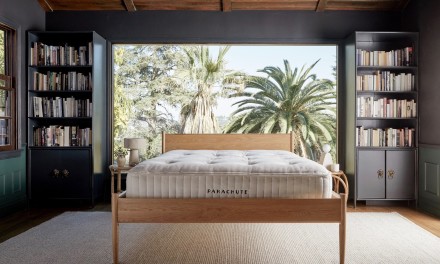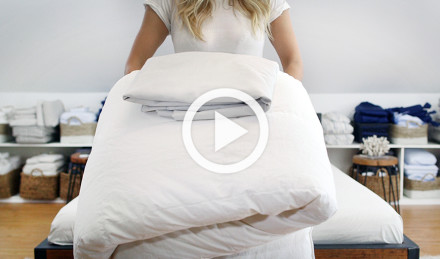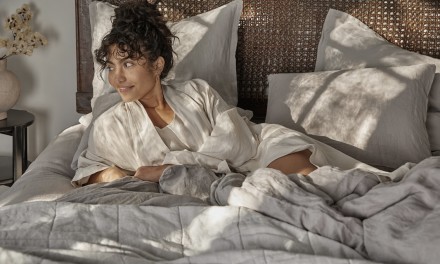The top sheet is one of the most polarizing and debated bed linen items on the market. Once a staple in bedrooms, it no longer enjoys a must-have status, especially among younger sleepers who question its functionality. But there are two sides to every story, and there are good reasons to revisit the top-sheet vs. no top sheet debate. As you’ll see, it’s worth exploring the pros and cons of adding a top sheet to your bed making process.
Keep reading for a detailed discussion on top sheets and why some people have chosen to go without them.
What Is a Top Sheet?
A top sheet is an oversized flat sheet that rests between you and your blanket or comforter while you sleep. Its primary purpose is hygienic, protecting the duvet from the dirt and bacteria our bodies shed during the night. A top sheet keeps the blanket clean longer, so you don’t have to wash it as often as you do your bedsheets. With fewer washings, your insulating layer will last longer.
Hot sleepers and those who live in warmer climates often use a top bed sheet as their only upper bedding layer. Top sheets also provide an extra soft layer between a sleeper and their duvet cover.
Top sheets come in many fabrics such as cotton, percale, sateen, linen or a blend of multiple materials. Materials are a key consideration when choosing top sheets, especially if you plan on using them only seasonally.
Linen is light, airy and breathable, making it a staple in summer design. A linen top sheet can be the perfect bedlinen cover choice during warmer months. Percale top sheets, on the other hand, are thicker, so if you need an extra layer in the winter, percale makes an excellent addition to your bed-making routine. If you prefer a year-round option, brushed cotton is your best bet.
To learn more about the different bedding materials, read our Fabric & Bedding Materials Guide.
What Is a Top Sheet?
A top sheet is an oversized flat sheet that rests between you and your blanket or comforter while you sleep. Its primary purpose is hygienic, protecting the duvet from the dirt and bacteria our bodies shed during the night. A top sheet keeps the blanket clean longer, so you don’t have to wash it as often as you do your bedsheets. With fewer washings, your insulating layer will last longer.
Hot sleepers and those who live in warmer climates often use a top bed sheet as their only upper bedding layer. Top sheets also provide an extra soft layer between a sleeper and their duvet cover.
Top sheets come in many fabrics such as cotton, percale, sateen, linen or a blend of multiple materials. Materials are a key consideration when choosing top sheets, especially if you plan on using them only seasonally.
Linen is light, airy and breathable, making it a staple in summer design. A linen top sheet can be the perfect bedlinen cover choice during warmer months. Percale top sheets, on the other hand, are thicker, so if you need an extra layer in the winter, percale makes an excellent addition to your bed-making routine. If you prefer a year-round option, brushed cotton is your best bet.
To learn more about the different bedding materials, read our Fabric & Bedding Materials Guide.
What are the Pros and Cons of Sleeping With a Top Sheet?
There are several benefits to sleeping with top sheets — or keeping a few in your bed linen closet to use occasionally.
First, top sheets regulate temperature. When sleeping with a duvet is too much in the summer, a single top sheet provides a breathable cover without trapping heat or moisture. In fact, it can let air circulate, keeping you cool and refreshed during the night. That’s why some people prefer to sleep with top sheets only.
In the winter, if you need an extra-cozy layer, adding a comforter atop the sheet creates an air-trapping effect to keep you toastier.
Another benefit to top sheets is preventing bacteria and fungi from building up on your comforter or blanket over time. The human body sheds millions of dead skin cells every night that end up in our bed linen. That’s where a top sheet can be helpful. It protects bulkier bedding from accumulating dirt and other contaminants inside. These items are costly and more difficult to clean. So by keeping them clean, you save both time and money.
If your duvet cover is made from a material that feels less-than-comfy against your skin, a soft top sheet will keep you cozy all night long.
Finally, a top sheet will prolong the life of your duvet cover, which tends to be a costly piece of bedding. So by investing in a high-quality top sheet, you’ll save the money and time that typically go into choosing a new duvet cover.
On the flip side, sleeping with a top sheet gives you an extra layer of bedding to make and style in the morning, which can be inconvenient. It also means you have to invest time and money into purchasing quality top sheets. If you do decide to opt in to having a top sheet, you’ll want to wash and dry your sheets every four to seven days.
To learn more about how a top sheet is different from a duvet cover, check out our guide on duvets and duvet covers.
What are the Pros and Cons of Sleeping With a Top Sheet?
There are several benefits to sleeping with top sheets — or keeping a few in your bed linen closet to use occasionally.
First, top sheets regulate temperature. When sleeping with a duvet is too much in the summer, a single top sheet provides a breathable cover without trapping heat or moisture. In fact, it can let air circulate, keeping you cool and refreshed during the night. That’s why some people prefer to sleep with top sheets only.
In the winter, if you need an extra-cozy layer, adding a comforter atop the sheet creates an air-trapping effect to keep you toastier.
Another benefit to top sheets is preventing bacteria and fungi from building up on your comforter or blanket over time. The human body sheds millions of dead skin cells every night that end up in our bed linen. That’s where a top sheet can be helpful. It protects bulkier bedding from accumulating dirt and other contaminants inside. These items are costly and more difficult to clean. So by keeping them clean, you save both time and money.
If your duvet cover is made from a material that feels less-than-comfy against your skin, a soft top sheet will keep you cozy all night long.
Finally, a top sheet will prolong the life of your duvet cover, which tends to be a costly piece of bedding. So by investing in a high-quality top sheet, you’ll save the money and time that typically go into choosing a new duvet cover.
On the flip side, sleeping with a top sheet gives you an extra layer of bedding to make and style in the morning, which can be inconvenient. It also means you have to invest time and money into purchasing quality top sheets. If you do decide to opt in to having a top sheet, you’ll want to wash and dry your sheets every four to seven days.
To learn more about how a top sheet is different from a duvet cover, check out our guide on duvets and duvet covers.
What are the Pros and Cons of Sleeping Without a Top Sheet?
Detractors of top sheets claim this bed linen item is no longer serving a meaningful purpose. Their main argument is that top sheets never stay put and usually end up tangled or crumpled at the foot of the bed. Because of that, the sheets don’t really protect the duvet cover. Instead, they slow you down in the morning when you have to make the bed. In this context, opting out of a top sheet can provide a more convenient and streamlined bed-making process.
Unraveling the inevitably tangled fabric from the foot of the bed seems so unnecessary when you could just pull forward the duvet and be out the door.
Another benefit to ditching the top sheet is that it can encourage you to clean and care better for your duvet cover and blankets. In a way, it serves as motivation to wash your top-of-bed layers more often.
However, not using a top sheet in a guest bedroom is a different story. If you host many people, your mattress and bedding need to be cared for more often. That takes time, especially when it comes to bulkier top-of-bedding layers. That’s why keeping a few top sheets in your guest room is a good idea. It also makes you a better host, since your guests may feel more comfortable sleeping with a top sheet.
Another reason not to use a top sheet is if you love the feel of your duvet. If you’ve invested in a soft cotton duvet cover, you may not see a lot of benefit to adding extra bedding that prevents you from experiencing its coziness.
And finally, if you live in a place with a mild climate, an extra bedding item can make the difference between a good night’s sleep and a restless night of sweating — or trying to untangle and adjust the top sheet.
What are the Pros and Cons of Sleeping Without a Top Sheet?
Detractors of top sheets claim this bed linen item is no longer serving a meaningful purpose. Their main argument is that top sheets never stay put and usually end up tangled or crumpled at the foot of the bed. Because of that, the sheets don’t really protect the duvet cover. Instead, they slow you down in the morning when you have to make the bed. In this context, opting out of a top sheet can provide a more convenient and streamlined bed-making process.
Unraveling the inevitably tangled fabric from the foot of the bed seems so unnecessary when you could just pull forward the duvet and be out the door.
Another benefit to ditching the top sheet is that it can encourage you to clean and care better for your duvet cover and blankets. In a way, it serves as motivation to wash your top-of-bed layers more often.
However, not using a top sheet in a guest bedroom is a different story. If you host many people, your mattress and bedding need to be cared for more often. That takes time, especially when it comes to bulkier top-of-bedding layers. That’s why keeping a few top sheets in your guest room is a good idea. It also makes you a better host, since your guests may feel more comfortable sleeping with a top sheet.
Another reason not to use a top sheet is if you love the feel of your duvet. If you’ve invested in a soft cotton duvet cover, you may not see a lot of benefit to adding extra bedding that prevents you from experiencing its coziness.
And finally, if you live in a place with a mild climate, an extra bedding item can make the difference between a good night’s sleep and a restless night of sweating — or trying to untangle and adjust the top sheet.
Top Sheet vs Flat Sheet
So what’s the difference between the different types of flat sheets that go on your bed? We usually refer to a bottom sheet as a “flat sheet.” This is the bedsheet that you sleep on and that covers the mattress or the mattress topper. Its purpose is to protect the mattress. There are two types of bottom sheets — a flat sheet and a fitted sheet. The former is a simple oversized bed sheet that you tuck under the mattress. The latter has an elastic hemline that envelops the mattress, preventing the sheet from coming off during the night.
A top sheet covers the sleepers legs and torso, and its main purpose is to protect your duvet or blanket. There is also a type of top sheet that’s a hybrid between a fitted sheet and a regular flat sheet. It’s essentially a semi-fitted top sheet that has elastic bands on one end only. That part should be tucked at the foot of the bed to prevent the top sheet from slipping or moving during the night. It’s convenient and keeps the bed looking neat, with no undone edges showing at the sides.
Each one of these bed sheets serves a specific purpose. Their design, material and size may vary, so you shouldn’t really use only a top sheet when you make your bed.
Want to learn how to make your bed an inviting place to come home to? See our article: How to Make a Bed Like a Professionally Styled Hotel Bed.
Top Sheet vs Flat Sheet
So what’s the difference between the different types of flat sheets that go on your bed? We usually refer to a bottom sheet as a “flat sheet.” This is the bedsheet that you sleep on and that covers the mattress or the mattress topper. Its purpose is to protect the mattress. There are two types of bottom sheets — a flat sheet and a fitted sheet. The former is a simple oversized bed sheet that you tuck under the mattress. The latter has an elastic hemline that envelops the mattress, preventing the sheet from coming off during the night.
A top sheet covers the sleepers legs and torso, and its main purpose is to protect your duvet or blanket. There is also a type of top sheet that’s a hybrid between a fitted sheet and a regular flat sheet. It’s essentially a semi-fitted top sheet that has elastic bands on one end only. That part should be tucked at the foot of the bed to prevent the top sheet from slipping or moving during the night. It’s convenient and keeps the bed looking neat, with no undone edges showing at the sides.
Each one of these bed sheets serves a specific purpose. Their design, material and size may vary, so you shouldn’t really use only a top sheet when you make your bed.
Want to learn how to make your bed an inviting place to come home to? See our article: How to Make a Bed Like a Professionally Styled Hotel Bed.
Where to Shop for High-Quality Top Sheets?
If you’re looking to buy a reliable top sheet brand, check out Parachute’s selection of top sheets. Because this is a piece of bedlinen that a lot of people opt out of, the top bed sheets you’ll find at Parachute are sold separately from our bed linen sets. This separation gives you the freedom to add as many or as few top sheets as you want to your bed linen closet.
Parachute’s top sheets are crafted from 100% long-staple Egyptian cotton, spun into fabric in a family-owned factory in Portugal. You’ll discover three types of cotton top sheets here: brushed cotton top sheets that are ultra-soft and feel like you’ve slept in them for years, crisp percale top sheets, and sateen top sheets for a luxurious look.
If you prefer the airiness of linen, look for a breathable and lightweight linen top sheet, available in multiple earthy shades for that effortlessly-chic look.
You’ll also find a selection of fitted sheets to complement the top sheet styles at Parachute. They feature an all-over elastic hem and fit mattresses up to 16 inches deep. And if you prefer to match your fitted sheet to your duvet cover, then browse through our duvet cover section that includes chic options in a variety of colors and styles.
Where to Shop for High-Quality Top Sheets?
If you’re looking to buy a reliable top sheet brand, check out Parachute’s selection of top sheets. Because this is a piece of bedlinen that a lot of people opt out of, the top bed sheets you’ll find at Parachute are sold separately from our bed linen sets. This separation gives you the freedom to add as many or as few top sheets as you want to your bed linen closet.
Parachute’s top sheets are crafted from 100% long-staple Egyptian cotton, spun into fabric in a family-owned factory in Portugal. You’ll discover three types of cotton top sheets here: brushed cotton top sheets that are ultra-soft and feel like you’ve slept in them for years, crisp percale top sheets, and sateen top sheets for a luxurious look.
If you prefer the airiness of linen, look for a breathable and lightweight linen top sheet, available in multiple earthy shades for that effortlessly-chic look.
You’ll also find a selection of fitted sheets to complement the top sheet styles at Parachute. They feature an all-over elastic hem and fit mattresses up to 16 inches deep. And if you prefer to match your fitted sheet to your duvet cover, then browse through our duvet cover section that includes chic options in a variety of colors and styles.







